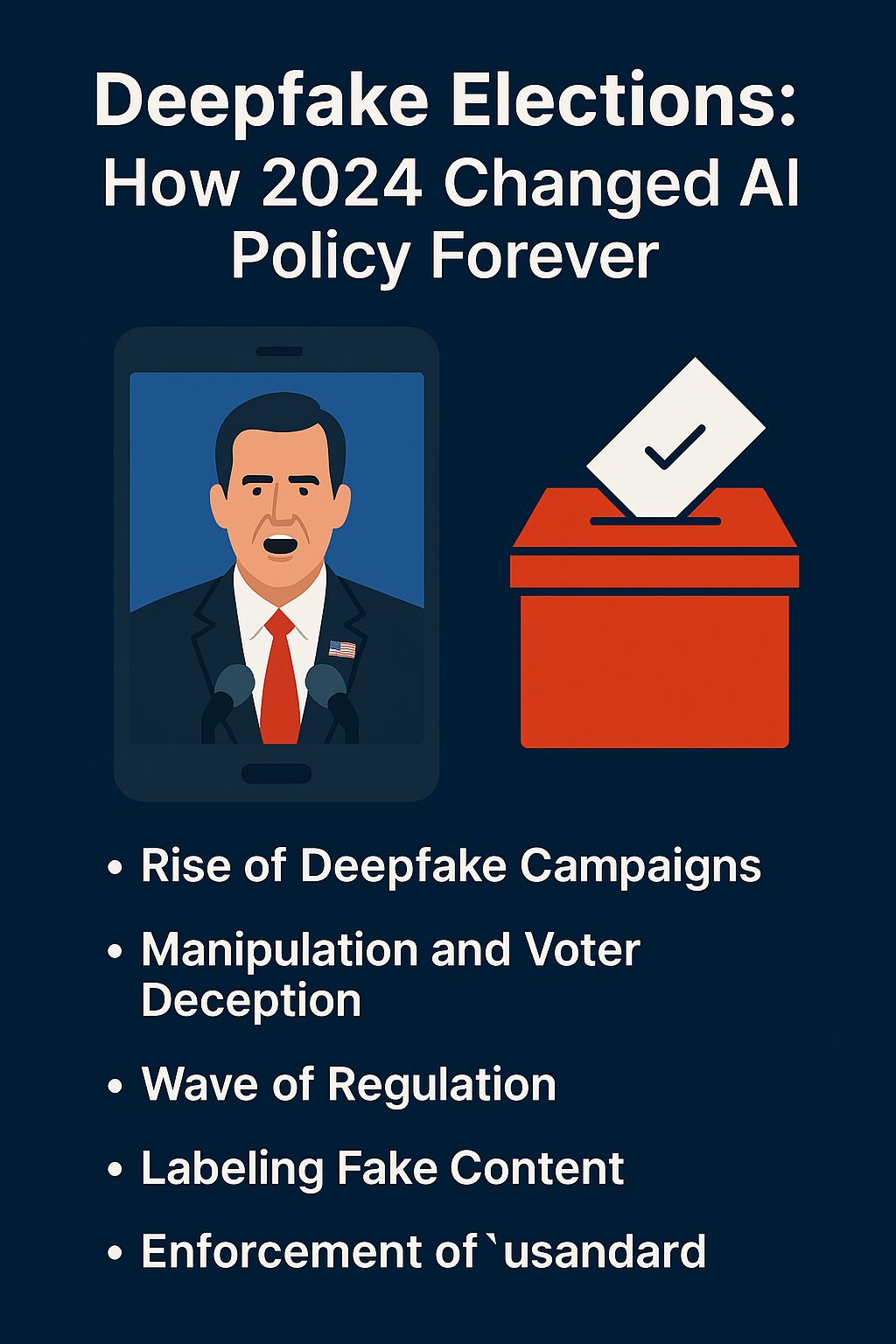Introduction
The year 2024 marked a turning point in the intersection of artificial intelligence and democracy. With over 60 countries holding elections—including the United States, India, Bangladesh, and the European Union—deepfake technology emerged as a powerful, disruptive force. From cloned voices to synthetic campaign videos, AI-generated content blurred the lines between truth and fiction, prompting governments to rethink their regulatory frameworks. This article explores how deepfakes influenced the 2024 elections and catalyzed sweeping changes in global AI policy.
🎭 The Rise of Deepfake Campaigns
What Are Deepfakes?
Deepfakes are AI-generated synthetic media—videos, images, or audio—that convincingly mimic real people. In 2024, they became tools for political manipulation, misinformation, and emotional persuasion.
Global Examples
- Bangladesh: Over 70 AI-generated campaign videos featured fictional citizens endorsing parties like Jamaat-e-Islami and BNP.
- India: Deepfakes showed deceased politicians endorsing candidates and fabricated speeches from top leaders.
- US: AI-generated robocalls mimicked President Biden’s voice, urging voters to skip primaries.
- Slovakia: A fake audio clip falsely implicated a candidate in election fraud.
These incidents highlighted the ease of access to AI tools like HeyGen, Synthesia, and DeepFaceLab, which allowed even amateur users to create convincing political content.
⚖️ Policy Shifts Triggered by Deepfake Disruption
United States
- 25 states introduced laws regulating AI in elections.
- Texas & Minnesota banned political deepfakes within a specific timeframe before voting.
- Federal proposals like H.R. 5586 aimed to protect victims of deepfake harm and national security.
European Union
- Digital Services Act (DSA): Mandated labeling of manipulated media by August 2025.
- AI Act: Introduced risk-based classification and watermarking requirements for deepfake content.
- EDMO Task Force: Flagged widespread disinformation and called for stronger fact-checking and transparency.
Bangladesh
- Election Commission acknowledged deepfakes as a “modern threat” but lacked clear legal directives.
- Experts urged for disclaimer mandates, content monitoring, and AI literacy campaigns.
United Nations
- Launched the AI and Multimedia Authenticity Standards Collaboration, uniting ISO, IEC, ITU, and tech giants like Adobe and Microsoft.
- Proposed global standards for content provenance, watermarking, and regulatory matrices.
📊 Impact on Democracy and Public Trust
| Effect | Description |
|---|---|
| Voter Manipulation | Deepfakes influenced voter sentiment through emotional and identity-based appeals. |
| Erosion of Trust | Citizens struggled to distinguish real from fake, undermining democratic institutions. |
| Legal Ambiguity | Many countries lacked specific laws to address AI-generated misinformation. |
| Tech Accountability | Platforms like Meta faced pressure to flag and remove synthetic political content. |
🔍 SEO Tips for Deepfake Election Content Creators
✅ Search-Friendly Titles
- “Deepfake Elections 2024: AI Policy Revolution”
- “How Synthetic Media Changed Democracy Forever”
✅ High-Impact Keywords
- “AI election laws 2024”
- “deepfake political videos”
- “global AI regulation after elections”
✅ Metadata Optimization
- Alt Text: “AI-generated political content disrupting elections in 2024”
- Tags: #DeepfakeElections #AIRegulation2024 #SyntheticMedia #ElectionSecurity
🧭 Final Thoughts
The 2024 elections exposed the vulnerabilities of democratic systems in the age of AI. Deepfakes didn’t just mislead voters—they reshaped global policy, forcing governments, tech companies, and civil society to confront the ethical and legal challenges of synthetic media. As we move forward, transparency, accountability, and international collaboration will be key to safeguarding future elections.

